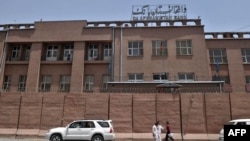Afghanistan's central bank Wednesday welcomed a U.S. federal judge's decision against turning over $3.5 billion in frozen Afghan funds to victims of the September 11, 2001 terror attacks to settle court judgments against the Taliban.
"The currency reserves are owned by Afghans, which are lawfully used for monetary stability, strengthening the financial system and facilitating trade with the world," said what is known as Da Afghanistan Bank, or DAB in a statement.
It renewed a call for the United States and other Western nations to unfreeze all Afghan central bank reserves to help "the beleaguered nation overcome their economic problems." The statement added that DAB was ready to fully cooperate with countries of the world and related institutions to address any international concerns.
Tuesday, District Judge George Daniels in New York ruled that the plaintiffs were not entitled the Afghan assets because U.S. courts lacked legal jurisdiction to authorize the seizure.
Daniels noted he was "constitutionally restrained" from letting victims seize the funds, saying it would amount to ruling that the Taliban are Afghanistan's legitimate government.
"The judgment creditors are entitled to collect on their default judgments and be made whole for the worst terrorist attack in our nation's history, but they cannot do so with the funds of the central bank of Afghanistan," Daniels wrote.
He added "the Taliban - not the former Islamic Republic of Afghanistan nor the Afghan people - must pay for the Taliban's liability in the 9/11 attacks."
The fundamentalist Taliban waged a deadly insurgency against the internationally supported Afghan government in Kabul before storming back to power in August 2021 as U.S.-led NATO troops withdrew from the country after almost two decades of war.
The United States and its allies invaded Afghanistan in late 2001 to oust the then-Taliban government for harboring the al-Qaida planners of the September 11 terror attacks on the U.S. that killed nearly 3,000 people.
No country has recognized the new Taliban government, citing human rights and terrorism concerns. Some Taliban cabinet members are under U.S. sanctions for their alleged involvement in terrorist activities.
Tuesday's court ruling dealt a blow to several groups of creditors that had claims against some of the $7 billion of DAB funds frozen at the Federal Reserve Bank in New York since the Taliban takeover 18 months ago.
Other Western nations also have frozen about $2 billion of DAB reserves in their banks.
U.S. President Joe Biden in February 2022 ordered $3.5 billion of the DAB funds set aside to help ease the suffering of the Afghan people.
That money has recently been transferred to a special Swiss-based Afghan Fund to help stabilize the Afghan economy and ease an already bad humanitarian crisis in the war-ravaged South Asian nation. Biden diverted the remaining $3.5 billion to potentially pay families of 9/11 victims pending court judgments against the Taliban.
"The decision deprives over 10,000 members of the 9/11 community of their right to collect compensation from the Taliban," said Lee Wolosky, a lawyer for one credit group known as the Havlish plaintiffs. "We believe it is wrongly decided and will appeal."
The other creditor groups were reportedly also planning an appeal.
Some information for this report came from Reuters.





